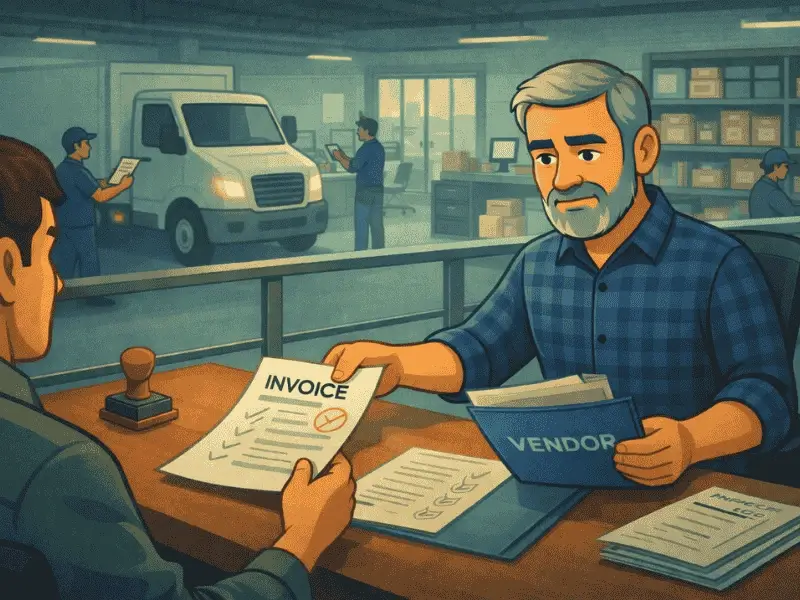Key Takeaways
Fuel cards are a convenient and efficient way for businesses to manage fuel expenses, allowing them to refuel at any gas station within a network of affiliated fuel stations. They offer exclusive fuel discounts, ensuring they pay the lowest prices and save significant costs over time.
🔹What is a fuel card?

A fuel card is a type of credit card specifically designed to manage and track fuel expenses for businesses with company-owned vehicles. It offers a convenient and efficient way to purchase fuel, allowing businesses to refuel at any gas station within a network of affiliated fuel stations. With a fuel card, businesses can take advantage of exclusive discounts on fuel, ensuring they pay the lowest prices available and save significant costs over time. Fuel cards are becoming extremely popular and the market has almost doubled in the last few years
One of the key advantages of fuel cards is their ability to provide real-time transaction details. Each fuel purchase made using the card is recorded, including the date, time, and location of the transaction. This level of transparency eliminates the need for manual fuel accounting and speeds up the reimbursement process. With a fuel card, businesses can easily track their fuel expenses and identify any unauthorized or abnormal purchases, enhancing control and preventing misuse.
Fuel cards also come with a dedicated customer service team to assist businesses with any card-related inquiries or issues they may encounter. These experts provide support in areas such as billing periods, payment terms, and transaction fees. Having access to a reliable customer service team ensures a hassle-free experience, allowing businesses to focus on their core operations without any worries about their fuel card.
An additional benefit of fuel cards is their positive impact on cash flow management. Instead of employees using personal credit cards for fuel expenses and having to wait for reimbursement, fuel cards streamline the reimbursement process. This helps to maintain a healthy cash flow by accurately and efficiently accounting for fuel costs. By reducing paperwork and simplifying expense tracking, businesses can allocate their resources more effectively and have a better understanding of their overall financial situation.
🔹How Fuel Cards Work?

Fuel cards are a convenient and efficient way for businesses to manage their fuel expenses. These cards work by allowing businesses to allocate funds and set spending limits for each cardholder. This feature ensures that employees do not overspend on fuel, helping businesses stay within their budget limits. Fuel cards also provide real-time transaction alerts, allowing businesses to monitor fuel purchases and quickly address any unauthorized or suspicious activities.
When it comes to refuelling, fuel cards offer businesses access to a wide network of gas stations. This means that company vehicles can refill at any participating gas station, regardless of their location. With exclusive discounts on fuel, businesses can take advantage of the lowest fuel prices available, resulting in significant cost savings over time.
Managing fuel consumption is made easier with fuel cards. Business owners can easily track fuel expenses by accessing detailed transaction information such as date, time, and location. This level of transparency eliminates the need for manual fuel accounting and speeds up the reimbursement process.
In addition to the convenience and cost savings, fuel cards also come with a dedicated customer service team. These experts are available to assist with any inquiries or issues related to the card, including billing periods, payment terms, and transaction fees. Their support ensures a hassle-free experience, allowing small business owners to focus on their core operations.
Furthermore, fuel cards can greatly improve cash flow for small businesses. By eliminating the need for employees to use their personal credit cards for fuel expenses and simplifying the reimbursement process, these cards ensure that fuel costs are accounted for accurately and efficiently. This helps businesses maintain a healthy cash flow and allocate resources more effectively.
In conclusion, fuel cards offer numerous benefits for businesses in managing their fuel expenses. With features such as spending limits, real-time alerts, and access to a wide network of gas stations, these cards streamline fuel management and provide cost savings. Combined with comprehensive transaction tracking and dedicated customer service, fuel cards are a valuable tool for improving cash flow and optimizing resources for small businesses.
🔹Benefits of a Fuel Card

A fuel card offers a range of benefits that can greatly benefit businesses of all sizes. With access to a wide network of gas stations, fuel cards provide convenience and flexibility for companies with a fleet of vehicles. No matter where your vehicles are located, they can easily refuel at any participating gas station. This eliminates the need for drivers to search for specific fuel stations or worry about finding a station that accepts company payment methods.
Not only can you refuel at any gas station, but fuel cards also come with exclusive discounts on fuel. This means that businesses can take advantage of the lowest fuel prices available, resulting in significant cost savings over time. With the rising prices of fuel, these discounts can make a big difference in your overall expenses. Plus, with the ability to track your fuel expenses, you can easily monitor your spending and ensure you are making the most of these discounts.
One of the biggest advantages of fuel cards is the ability to efficiently manage fuel consumption. With detailed transaction information, such as the date, time, and location of each purchase, fuel cards provide complete transparency. This eliminates the need for manual fuel accounting and speeds up the reimbursement process. With this level of visibility, you can easily track your fuel expenses and identify any abnormalities or unauthorised purchases.
In addition to convenience and cost savings, fuel cards also come with a dedicated customer service team. These experts are available to assist with any card-related inquiries or issues you may encounter. Whether you have questions about billing periods, payment terms, or transaction fees, they are there to provide you with the support you need. This ensures a hassle-free experience, allowing you to focus on your core operations without any worries about your fuel card
🔹Why Use a Fuel Card?

Using a fuel card offers numerous advantages for businesses when it comes to managing fuel expenses. Fuel cards provide real-time data and spending limits, making it easier to track and control fuel purchases. Unlike traditional credit cards, fuel cards are specifically designed for use at gas stations, ensuring that your employees can efficiently fuel up company vehicles without any hassle.
One of the key reasons to use a fuel card is to gain better control over fuel consumption and costs. With a fuel card, you can set spending limits for each cardholder, ensuring that fuel expenses remain within budget. This helps to prevent excessive or unauthorized purchases, resulting in significant cost savings for your business.
Furthermore, fuel cards often come with exclusive discounts and rewards programs. By taking advantage of these offers, you can save money on fuel prices and generate substantial savings over time. This is especially beneficial for businesses with mixed fuel fleets, as they can secure the best discounts for both gasoline and diesel fuel purchases.
Another advantage of using a fuel card is the automatic fuel accounting it provides. Instead of relying on employee fuel receipts and manually entering data into your accounting system, fuel card transactions are recorded electronically. This not only saves valuable time but also ensures accurate and detailed transaction records that can be easily integrated into your accounting processes.
Additionally, fuel cards provide real-time alerts and purchase controls. This means that you can receive instant notifications for each transaction, allowing you to closely monitor fuel usage and fuel efficiency measures and quickly identify any unauthorized or suspicious activity. This helps to strengthen security measures and prevent fraud, enhancing the overall safety of your fleet operations.
When it comes to customer service, fuel card providers understand the importance of prompt and reliable support. Many companies offer dedicated customer service teams that are available to assist you with any inquiries or issues regarding your fuel card. This ensures that you receive the necessary support to resolve any concerns and ensures a smooth and seamless experience using the fuel card.
Using a fuel card also offers cash flow benefits for your business. Most fuel card providers offer billing periods that allow you to delay payments, providing additional time to manage your finances and maintain a healthy cash flow. This can be particularly advantageous for businesses that require flexibility in their payment terms.
Download Our Free Fleet Maintenance Resources Now!
🔹Fuel Cards for Business
Fuel cards have become an essential tool for businesses that operate a fleet of vehicles. These specially designed cards help companies manage their fuel expenses efficiently and effectively. With a fleet fuel card, businesses can monitor and control their fuel consumption in real-time, while also enjoying exclusive discounts and benefits.
One of the key advantages of using a fleet fuel card is the ability to set spending limits for each cardholder. This prevents employees from overspending on fuel and ensures that all purchases are within the company's budget. The card also eliminates the need for employees to use their personal credit cards for fuel expenses, simplifying the reimbursement process.
Another significant advantage of fleet fuel cards is the extensive network of gas stations available for fuel purchases. These cards are accepted at multiple fuel stations across the country, providing ease and convenience for businesses with vehicles operating in different locations. By offering the option to choose from a wide variety of gas stations, fleet fuel cards enable companies to find the lowest fuel prices available at any given time, resulting in substantial cost savings.
Additionally, fleet fuel cards offer enhanced security measures and purchase controls. Businesses can track and monitor each transaction in real time, accessing detailed transaction details such as the date, time, and location of each fuel purchase. This level of transparency helps prevent fraud and unauthorized usage of the card.
Furthermore, fleet fuel cards also offer automatic fuel accounting, eliminating the need for manual reconciliation of employee fuel receipts. This not only saves valuable time but also improves cash flow by providing accurate and timely information on fuel expenses.
Finally, businesses using fleet fuel cards can benefit from average savings on fuel costs. These cards often offer discounts on fuel purchases, resulting in significant savings over time. With the fluctuating fuel prices, having access to these exclusive discounts is invaluable for businesses looking to optimize their fuel expenses.
🔹Fuel Cards for Small Business
Fuel cards have become a game-changer for small businesses that rely on vehicles for their daily operations. These cards offer a convenient and efficient way to manage fuel expenses, providing a range of benefits specially designed for businesses with limited resources.
One of the key advantages of using a fuel card is the ability to set spending limits for each cardholder. This feature ensures that employees do not overspend on fuel, helping businesses stay within their budget limits. With real-time transaction alerts, businesses can monitor fuel purchases and quickly address any unauthorized or suspicious activities.
Fuel cards also offer small businesses access to a wide network of gas stations. This means that company vehicles can refill at any participating gas station, regardless of their location. With exclusive discounts on fuel, businesses can take advantage of the lowest fuel prices available, resulting in significant cost savings over time.
Additionally, fuel cards provide small businesses with valuable tools to control and track their fuel consumption. Business owners can easily track fuel expenses by accessing detailed transaction information such as date, time, and location. This level of transparency eliminates the need for manual fuel accounting and speeds up the reimbursement process.
Moreover, fuel cards can greatly improve cash flow for small businesses. By eliminating the need for employees to use their personal credit cards for fuel expenses and simplifying the reimbursement process, these cards ensure that fuel costs are accounted for accurately and efficiently. This helps businesses maintain a healthy cash flow and allocate resources more effectively.
🔹How Does a Company Fuel Card Work?
A company fuel card is designed to simplify and streamline the fuel purchasing process for businesses. So, how does it actually work?
When a company enrolls in a fuel card program, they are provided with a fleet fuel card that is linked to their account. Each card is typically assigned to a specific driver or vehicle in the fleet.
When it's time to refuel, the driver simply presents the fuel card at the gas station and swipes it at the pump or hands it to the attendant inside. The transaction is then processed, and the fuel purchase is charged directly to the company's fuel card account.
One of the key benefits of a company fuel card is the ability to set spending limits for each cardholder. This helps to control fuel expenses and prevent unauthorized or excessive purchases. For example, if a driver's spending limit is set at $100, they won't be able to spend more than that amount without prior authorization. This helps businesses stay on budget and avoid overspending on fuel costs.
In addition to spending limits, fuel cards often come with added features and benefits. Many providers offer exclusive discounts and rewards programs that enable businesses to save money on fuel prices. These discounts can add up over time and result in significant cost savings for the company.
Moreover, a company fuel card can provide valuable real-time data and insights. Each fuel transaction is recorded electronically, providing a detailed record of fuel usage and expenses. This data can be easily accessed and integrated into the company's accounting system, eliminating the need for manual entry of receipts and ensuring accurate and up-to-date fuel accounting.
Furthermore, fuel card providers often offer advanced control and security features. Businesses, like construction companies, with diverse fleets can set purchase controls, such as restrictions on types of fuel or time of day for fuel purchases. This helps to prevent misuse of the fuel card and enhances security measures. Additionally, fuel card providers have customer service teams available to assist businesses with any inquiries or issues that may arise.
🔹Company Fuel Card Policy
A company fuel card policy is an essential tool for businesses with a fleet of vehicles. It establishes guidelines and regulations for the use of fuel cards, ensuring that employees understand their responsibilities and adhere to proper usage. By implementing a comprehensive fuel card policy, companies can effectively manage their fuel expenses, improve tracking and reporting, and minimize the risk of fraudulent activity.
One key aspect of a company fuel card policy is the establishment of spending limits. By setting limits on fuel purchases, businesses can control and monitor their fuel expenses more effectively. This helps prevent overspending and ensures that employees stay within allocated budgets. Spending limits can be based on factors such as vehicle type, employee position, or specific job requirements, enabling companies to tailor their policies to their unique needs.
In addition to spending limits, a fuel card policy should outline clear guidelines for fuel card usage. This includes specifying which types of purchases are allowed, such as fuel, oil, or other necessary vehicle maintenance expenses. It may also address restrictions on non-fuel purchases or the use of fuel cards for personal use. By establishing proper usage guidelines, businesses can prevent the misuse of fuel cards and maintain control over company resources.
Another important component of a fuel card policy is the requirement for regular reporting and reconciliation. Companies should outline a process for employees to submit accurate and timely reports of their fuel card usage. This ensures that all fuel purchases are recorded and accounted for, making it easier to track expenses and identify any discrepancies. Regular reconciliation of fuel card statements with accounting records helps maintain accuracy and transparency in fuel spending.
Furthermore, a fuel card policy should address security measures to protect against fraud and unauthorized use. This includes guidelines for safeguarding fuel card information, such as not sharing card details or PIN numbers with unauthorized individuals. It may also outline procedures for reporting lost or stolen cards and the steps to be taken to minimize any potential losses.
Lastly, a company fuel card policy should establish consequences for non-compliance. This could include disciplinary actions for employees who misuse fuel cards or violate the policy. By clearly communicating the consequences of policy violations, companies can deter employees from engaging in fraudulent or unauthorized activities and maintain accountability within the organization.
🔹Fuel Card Tax Implications
Fuel cards can be incredibly beneficial for businesses when it comes to managing fuel expenses. However, it's important to be aware of the potential tax implications that come with using these cards. When properly understood and accounted for, fuel card expenses can be deducted as a business expense, which can help reduce your overall tax liability.
One of the key tax benefits of using a fuel card is the ability to track and report fuel expenses accurately. Unlike traditional cash or credit card purchases, fuel cards provide detailed transaction records that can be easily integrated into your accounting system. This allows you to easily track and categorize fuel expenses, making it simpler to differentiate between personal and business-related fuel costs.
Additionally, fuel card expenses are considered ordinary and necessary business expenses, which means that they can be deducted from your taxable income. These deductions can significantly reduce your overall tax liability and ultimately save your business money. However, it's crucial to maintain thorough records and ensure that your expenses meet the requirements set by the Internal Revenue Service (IRS) to qualify for deductions.
To maximize the tax benefits of using a fuel card, it's essential to have a well-documented and organized system in place. This includes keeping copies of all fuel card statements, receipts, and invoices. It's also important to clearly separate personal and business-related fuel expenses and have a designated process for tracking and recording each expense.
While fuel card expenses can be deductible, there are some limitations and restrictions to keep in mind. For example, if you're using your fuel card for personal expenses, those costs are not eligible for a business expense deduction. Additionally, it's important to ensure that the fuel expenses are directly related to your business operations and are not considered extravagant or unnecessary.
To ensure you're taking full advantage of the tax benefits associated with fuel card usage, it's highly recommended to consult with a tax professional or accountant. They can provide guidance and assistance in navigating the complex tax laws and regulations surrounding fuel card expenses.
In conclusion, a company fuel card is a convenient and efficient tool for businesses looking to streamline their fuel expenses. It offers numerous benefits, such as real-time controls, purchase limits, discounts and rewards programs, and advanced security features. By taking advantage of these features, businesses can save money on fuel costs while gaining better control over their fuel purchases.



.png)








.png)


.png)



.avif)






